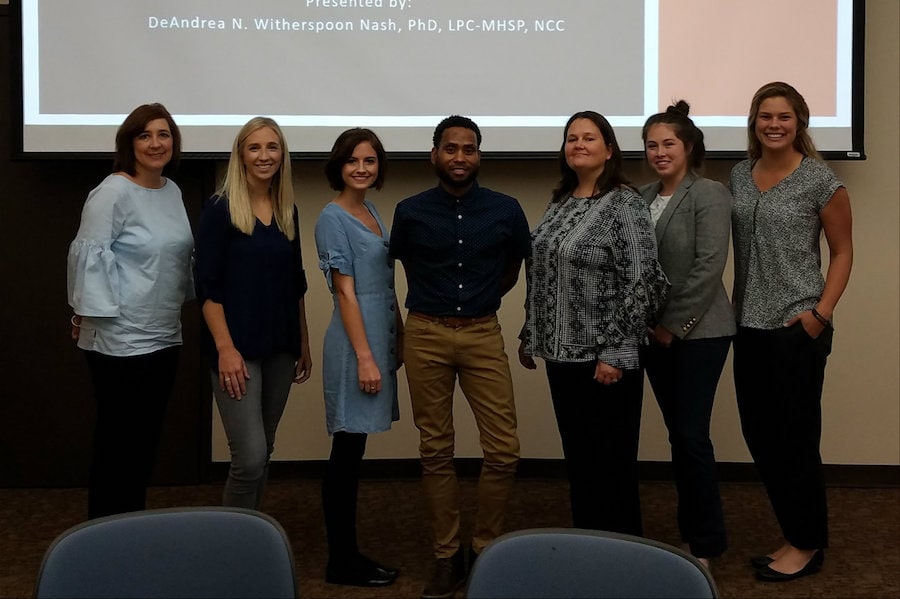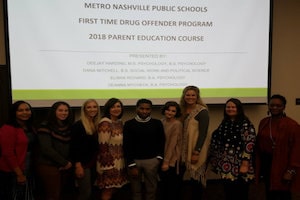Lipscomb's addictions specialists educate youth on the dangers of drug use
Anna Moseley |

Seven Lipscomb University students in the Master of Science in Clinical Mental Health Counseling program are working alongside Dr. DeAndrea Witherspoon Nash and Metro Nashville Public Schools (MNPS) to inform students and parents of the danger and prevalence of drug use.
Students in Lipscomb’s Addictions Specialization will complete the academic requirements which will allow them to pursue two licenses in Tennessee: Licensed Professional Counselor with Mental Health Service Provider designation (LPC-MHSP) and Licensed Alcohol and Drug Abuse Counselor (LADAC).
The addictions specialization program has a partnership with Cumberland Heights, a nationally recognized alcohol and drug treatment center, that provides students the opportunity to complete their practicum and internship with a variety of populations. Students can choose practicum experiences in the residential men's, women's, young men's, adolescent males' and family programs.
Since joining the Clinical Mental Health Counseling program as an assistant professor in January of 2018, Witherspoon Nash has given students in the addictions specialization program another opportunity to gain experience in their desired career field.
Now students have the opportunity to gain experience through the MNPS First Time Drug Offender program. This opportunity to teach MNPS students, allows the addictions specialization students to implement what they are learning in the classroom and clinical sites in a community-based setting.
“The students have expressed how important it is for them to be able to learn this information and at the same time be placed at a site that specializes in this type of substance abuse treatment,” said Witherspoon Nash.
Witherspoon Nash has been a program facilitator of the First Time Drug Offender program for the past seven years, and has been facilitating parent education for the last two years. The First Time Drug Offender program was created for students but now provides a space for parents to learn and feel supported.
“The First Time Drug Offenders Program is available for students in grades five through 12 who are found to be in violation of their first drug offense, excluding possession with the intent to distribute” said Stephanie Davis, Drug Education Coordinator for Metro Nashville Public Schools.
“The program was created to allow the school district to provide drug education and counseling as opposed to a harsh exclusionary consequence such as expulsion for up to one calendar year for a zero-tolerance infraction," said Dr. Tony Majors, MNPS Executive Officer for Student Services. "Student who are found to be in possession of, or under the influence of illegal drugs for the first time and who are not accused of drug distribution, have the option of participating in the program as opposed to facing a disciplinary hearing for expulsion. Higher scheduled drugs such as methamphetamine and cocaine are not eligible for diversion. The program requires that students participate in a drug screen, serve a five day out of school suspension, and participate in an eight-hour drug education class. Parents are also required to participate in a two-hour drug education training on the same day as their children.”

In order to ensure that the program is helpful to both the students and their parents, the parents have an opportunity to share what aspects of the program were helpful to them. Parents mentioned “a lot of (their) questions were answered” during facilitation and that this facilitation helped them feel less alone and embarrassed “once (they) saw how many parents were going through the same problem.”
The seven students in the program, Damon Harding, Deanna Wycheck, Dana Mitchell, Elisha Richard, Elizabeth Winton, Blakely Hunze and Victoria Coakley, participated as facilitators of the First Time Drug Offender program on Nov. 17 under the direct supervision of Witherspoon Nash. Three students facilitated the adolescent restorative circle and the other four facilitated the parent education course.
As the opioid crisis continues, so does the demand for specialists in the field of alcohol and drug treatment, and Lipscomb University is the only faith-based, CACREP accredited university in the south that offers this unique program, said Witherspoon Nash.
According to the National Institute on Drug Abuse, 1,186 people died in 2016 from an opioid-related overdose in Tennessee. By allowing Clinical Mental Health students to train in the addictions field, Lipscomb is creating future professionals that will assist in fighting the opioid crisis as well as other chemical substances.
The First Time Drug Offender program gives the MNPS students a much-needed education on the drugs and substances they use, as well as resources on healthy skills to cope with life stressors and how to ask for help. Blakely Hunze, a Clinical Mental Health Counseling graduate student, said our society is still so blind to the issue and this program is a great way to spread awareness.
“It is neat to see the kids coming in prior to treatment and learning about addiction,” said Hunze. “I think that it is an amazing way to plant the seed and hopefully push them to learn more about addiction and the (substance) that they’re using. It gave me a good perspective of what kids look like when they first get into trouble for drugs and alcohol. It also showed me how little families tend to know about addiction.”
Planting the seed is exactly what Witherspoon Nash and Davis are hoping this program does.
“Through this unique partnership with MNPS, students will facilitate candid discussions in a strengths-based manner to assist families in identifying warning signs of use, building prevention goals, processing barriers, and identifying community resources- all with a clear focus on education,” said Witherspoon Nash. “The beauty of the process is witnessing the moment when parents realize they are not alone, that their family is ‘not the only one’ impacted by the consequences of drugs and drug-related behaviors, and that help is available.”
Davis expressed the necessity of the First Time Drug Offender program and her gratitude to Witherspoon Nash for her contribution.
“There is no doubt in my mind that without the commitment, the passion and the work of Dr. Witherspoon Nash, we could not pull this facilitation off,” said Davis.
Now that the graduate students are gaining experience through the facilitation of this program with Witherspoon Nash, more mental health clinicians will be ready to tackle the ongoing opioid crisis and combat use of alcohol and other drugs in the community.
For more information on Lipscomb’s Clinical Mental Health Counseling program, click here.